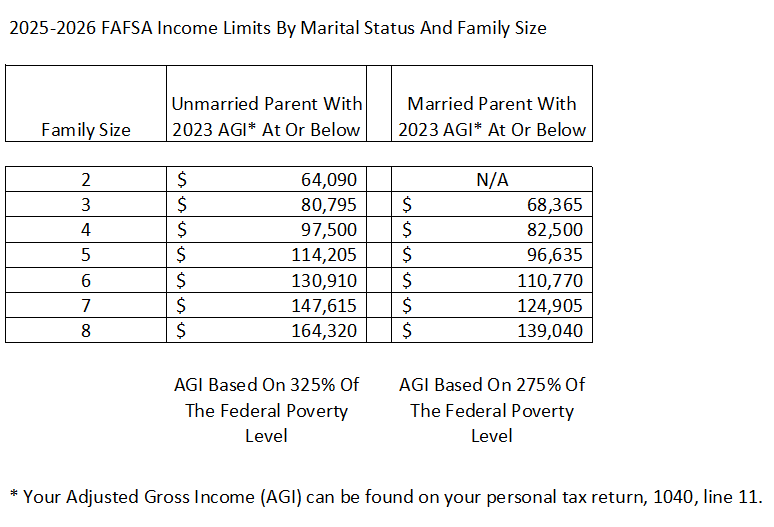The 2024-2025 FAFSA, which applies to the Fall 2024, Spring 2025 and Summer 2025 academic year, is available until June 30, 2025.
The 2025-2026 FAFSA, which applies to the Fall 2025, Spring 2026 and Summer 2026 academic year, will be available December 1, 2024. TCNJ’s priority application deadline is February 15, 2025. The State of New Jersey’s FAFSA application deadline is April 15, 2025.
FAFSA changes:
The FAFSA Simplification Act was passed by Congress and represents a significant overhaul of the processes and systems used to award federal student aid. These changes took effect for the 2024-2025 academic year and will continue for future academic years. This includes the Free Application for Federal Student Aid (FAFSA) form, the need analysis that determines federal aid eligibility, changes in terminology, and many policies and procedures for schools that participate in federal student aid programs.
What changed on the FAFSA?
There were a number of benefits of the FAFSA simplification act, including a more streamlined application process and a better user experience for the FAFSA, expanded eligibility for federal student aid, and reduced barriers for certain student populations (e.g., homeless and unaccompanied youth, incarcerated students, English language learners, and students from low-income backgrounds).
Some fundamental changes include, but are not limited to:
The federal eligibility income amounts are now public:
The household income maximums for 2025-2026 are listed below.

Please note that the income maximums listed above are a guide to assist families on their potential eligibility for grants but other factors such as assets reported on the FAFSA may decrease eligibility.
The maximum Pell grant award for the 2025-2026 academic year is $7,395 and the minimum Pell grant award is $740. Your household income would need to be at or below the amounts listed above, based on your family size and marital status, to be eligible for a Pell grant.
The State of NJ does not publish the income maximums for State grant eligibility but families can use the federal income maximums as a guide for that eligibility as well.
A reduction in the number of questions on the form:
The FAFSA reduced the maximum number of questions from 108 to 39. Since the FAFSA on the Web is dynamic, some students will not even be presented with all 39 questions. This streamlined format will simplify the application process and make it less daunting for students and their families.
Federal tax information automatically populated:
Prior to 2024-2025, users had the option to enter their tax information manually or use the IRS Data Retrieval Tool. Currently, all persons on the FAFSA must provide consent for the Department of Education to receive tax information or confirmation of non-filing status directly from the IRS. In a very small number of cases, students and families will have to enter their tax data manually, but for most, that data will be automatically transferred into the application. This change makes it easier to complete the FAFSA and reduces the number of questions to be answered.
Parents are now Contributors:
A contributor—a new term introduced for the 2024-25 FAFSA—refers to anyone who is required to provide information on a student’s form (such as a parent/stepparent or spouse). A student or parent’s answers on the FAFSA will determine which contributors (if any) will be required to provide information.
Contributors will receive an email informing them that they have been identified as such by the student, and will need to log in to the FAFSA using their own FSA ID. If the Contributor does not have an FSA ID, they can create one at studentaid.gov.
Being a contributor does not mean they are financially responsible for the student’s education costs, but it does mean the contributor must provide information on the FAFSA or the application will be incomplete and the student will not be eligible for federal student aid.
The number of students in college no longer a factor in the federal eligibility formula:
Previously, the FAFSA calculated the number of household members attending college into the eligibility calculation, dividing it proportionately to determine federal aid eligibility. The application will still ask how many household members are in college, but your answer will not affect federal aid eligibility. The State of NJ will still consider it in their eligibility determinations.
For divorced or separated parents, the parent responsible for providing information on the FAFSA has changed:
For dependent students, financial information was previously needed from the parent(s) the student had lived with the most in the last 12 months prior to completing the FAFSA. With the new FAFSA that has changed, now, financial information will be required from the parent(s) who provided the most financial support to the student in the previous 12 months prior to completing the FAFSA. Therefore, the parent with the higher income must provide their information on the FAFSA.
Family farms and small business must be reported as assets:
When required, families must now report the value of their small business or family farm. If the family farm includes the principal place of residence, applicants should determine the total net value of all farm assets and subtract the net value of their principal residence to determine the final value of their farm assets.
Expected Family Contribution” (EFC) is changing to “Student Aid Index” (SAI):
The SAI is a number that determines each student’s eligibility for certain types of federal student aid and will be used for awarding need-based grants, loans, and other aid types.
Incomplete forms expire after 45 days:
Any FAFSA that is left incomplete will expire after 45 days, which means the form will have to be restarted and all contributors must redo their sections. Reminder emails will be sent to contributors every seven days.
